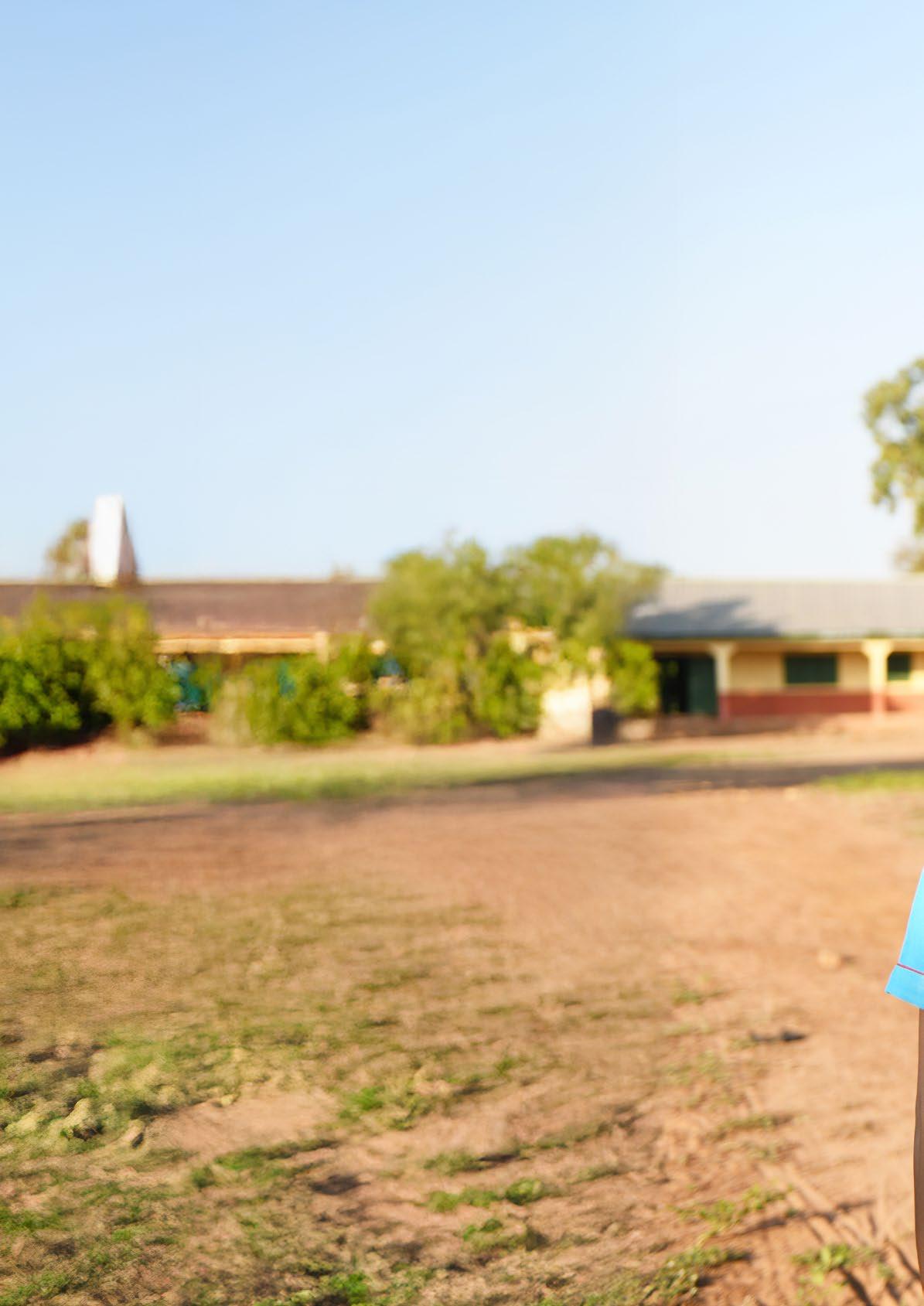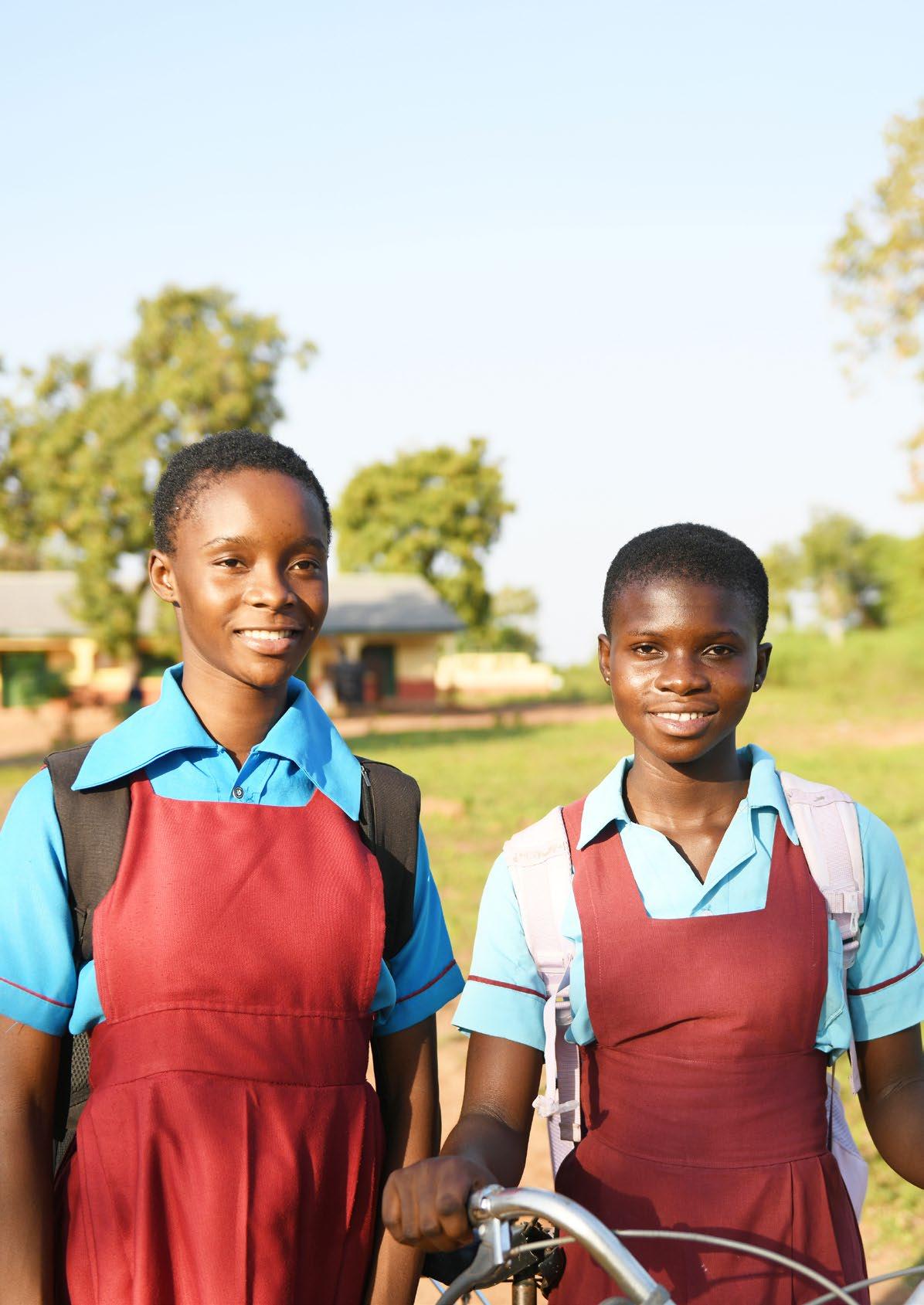
Together we are...
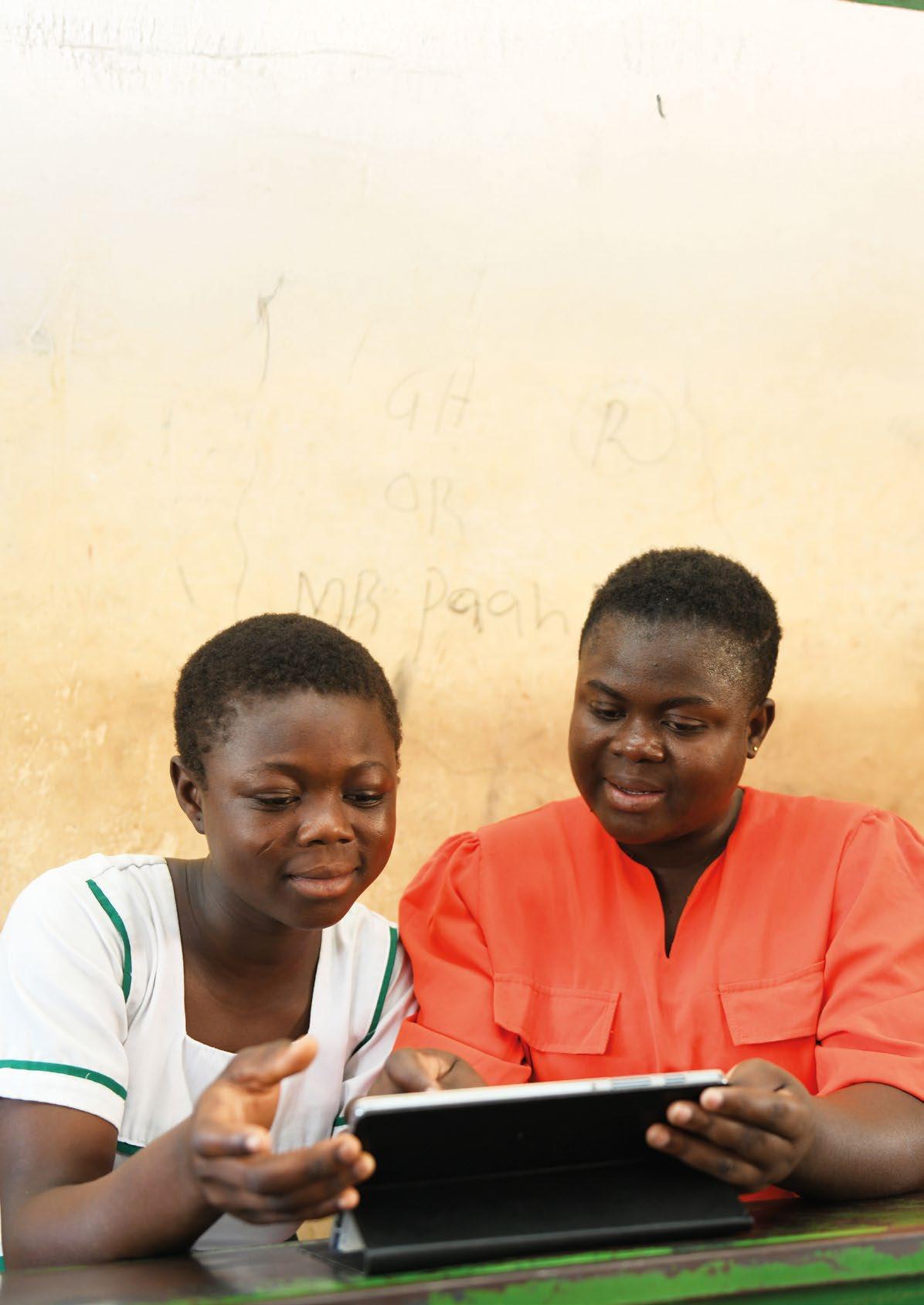


Together we are...

With any annual report, the temptation is to flood it with our impact in numbers reached, months covered, and percentage points shifted. More so when we are this excited to see how more and more educated young women leaders are accelerating our pan-African movement. True that metrics are the currency of big visions, multi-year scaling plans and strategic partnerships. For anyone more interested in the detailed metrics, rest assured we have lots to share.
With this report we are focusing on what’s at the heart of all we do together, reminding each other that each figure and metric we share represents a life, and that our success is measured by the experience of each individual girl. So, as we share this annual report, we want to bring you the stories that really matter most – those of the girls at the heart of our work. Thousands of individuals; girls who reside in the remotest corners of rural Africa, and are facing the hardest, most severe barriers to education and independence. This year’s story is their story to tell. Accounts of resilience in navigating famine, cholera, hyperinflation, child pregnancy, disability and displacement. In this report, you can follow their journey and see how as CAMFED, we have held up our end of the bargain – and enabled each girl to learn, thrive and succeed against the odds.
This is what we mean when we talk about accountability to the girl. We are answerable first and foremost to her. Our agenda is simple: to bring her story to you, and to all the parents, teachers, traditional leaders, governments and donors around the world who are committed to navigating the risks and complexities of these times alongside her. If she is vulnerable, so are we. If she fails, so do we. If she thrives, so do we.
Today, CAMFED is active in 11 countries, delivering programs in six. If you are receiving this report, it is because you are a member of the community that shares our commitment to girls’ education. With this report we extend our deepest gratitude to each of you: the ambitious, courageous and audacious you-who dares to put the needs of the most vulnerable child first and respond to her need and potential.
You are making a tangible difference every day in the lives of young people who most need our support.
Tuko Pamoja: Together we are!
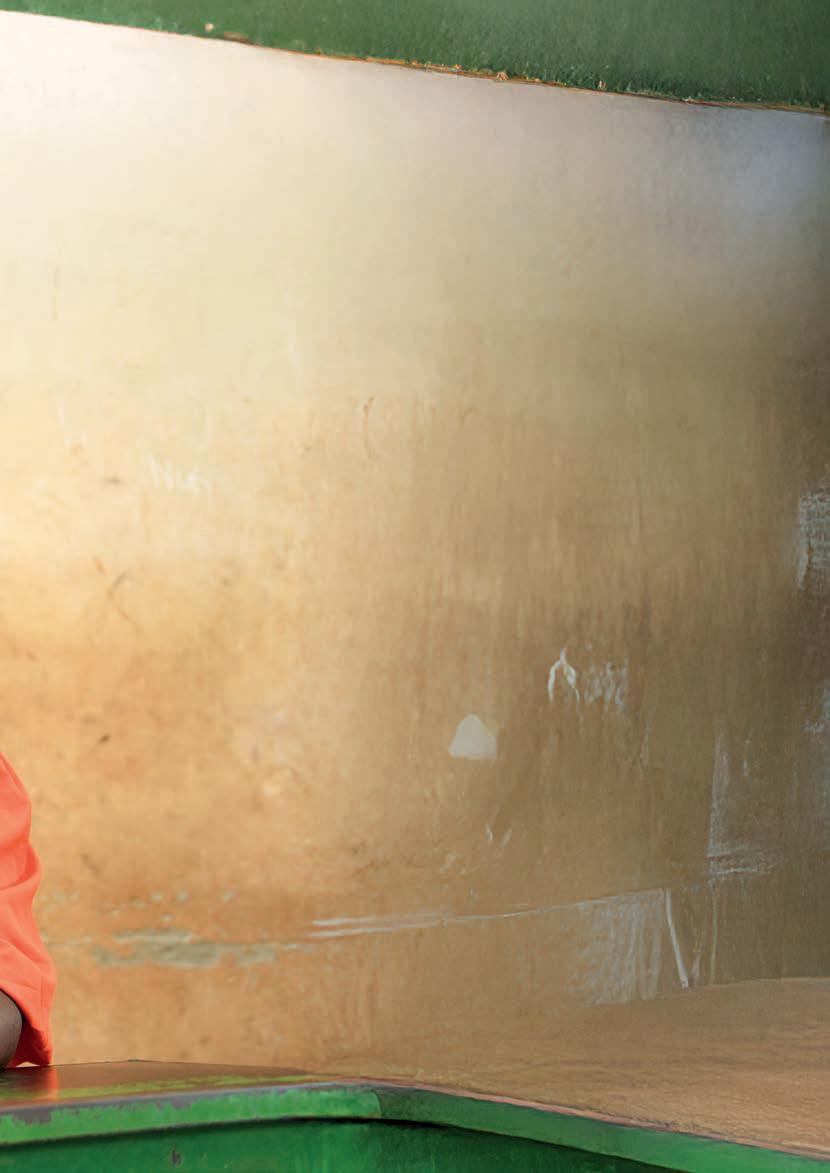
Angie Murimirwa, Chief Executive Officer & Emily Zemke, Chief Development Officer
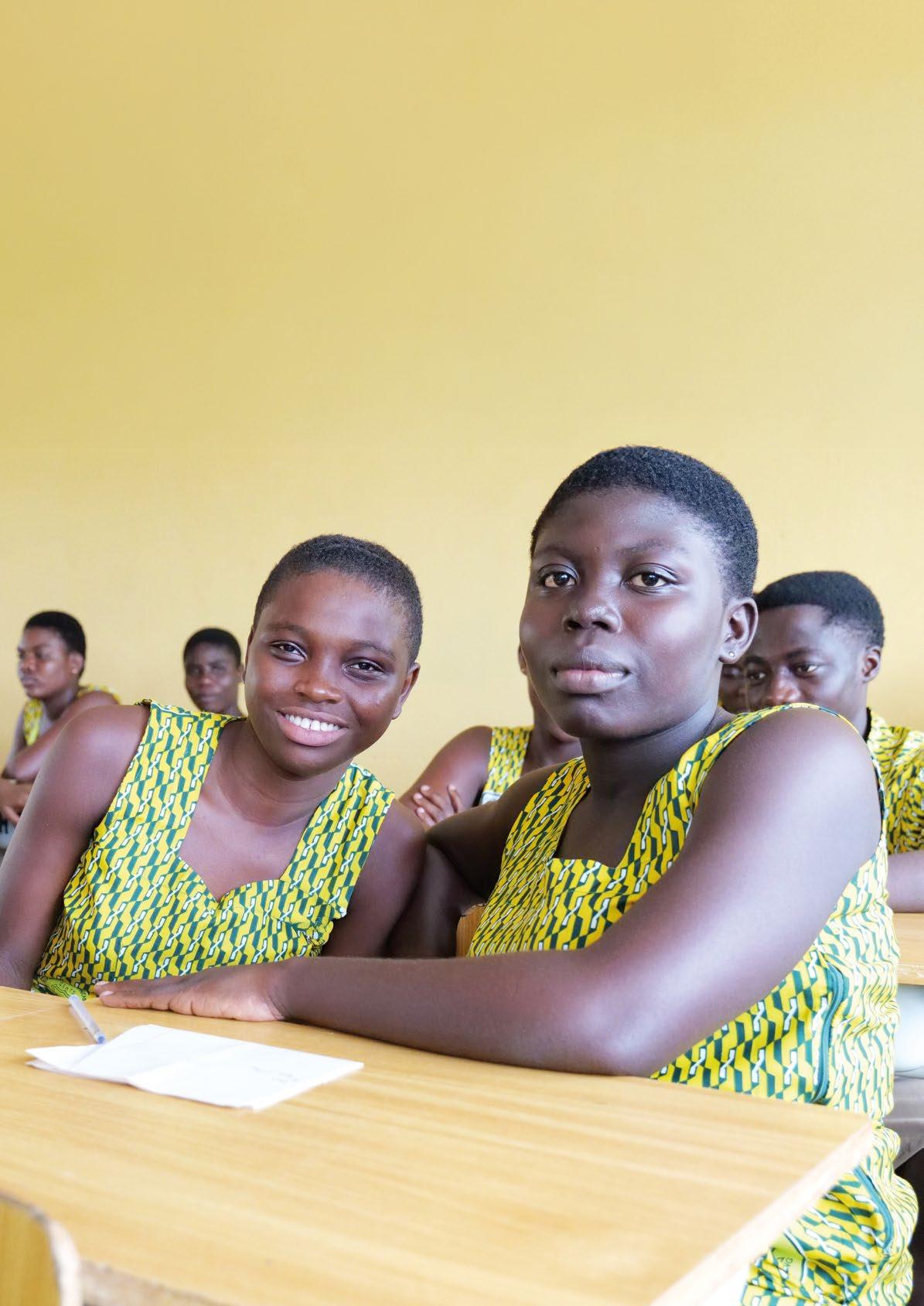







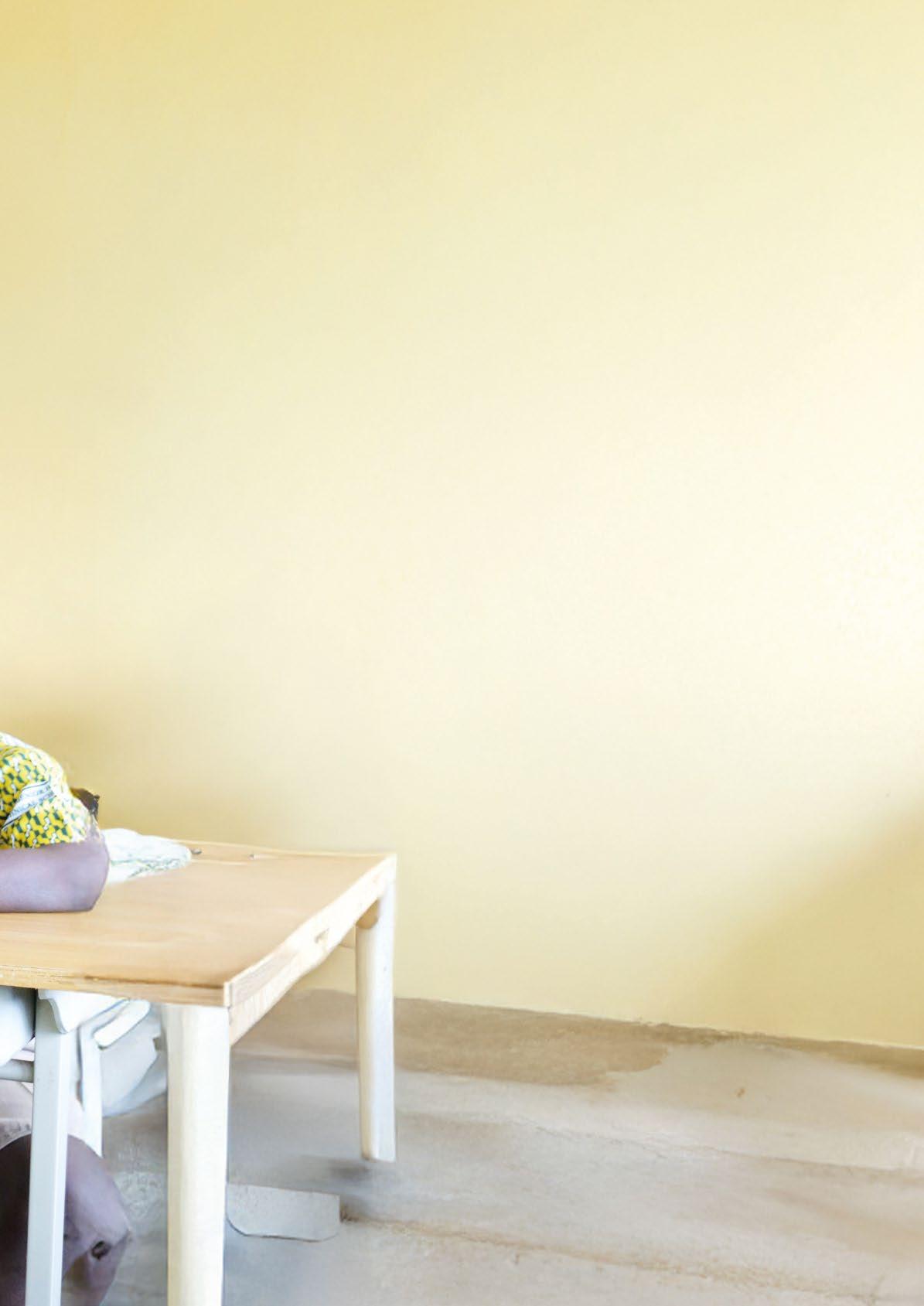



















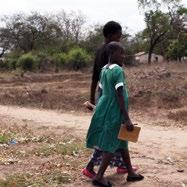

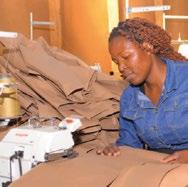
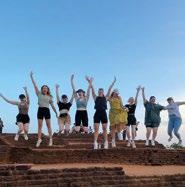
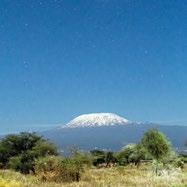
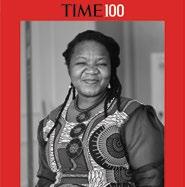
Copyright © CAMFED International 2025 www.CAMFED.org
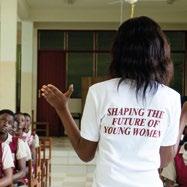
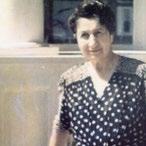
Photo credits: Anke Adams, Ben Leo Hollis, Buta Photography, Catherine Cardwell, Catherine Wood, Chilo ‘23 Media, Conrad N. Hilton Foundation, Eliza Powell, Jasmina Tomic, Lenore England, Lydia Leyland, Maryanne Heslop, Next Pixel, Tafadzwa Ufumeli With some photographs, generative AI may have been used to extend and subtly enhance photography. CAMFED always uses AI with extreme sensitivity and always with full consideration for the subject’s integrity. 6 8 10 14 18 20 22 24


































































































































































































his year marks the midpoint in a decade of accelerated ambition as CAMFED aims to ensure millions of the world’s most marginalized girls can go to and stay in school.
Our ambitious goal is to reach 8 million extremely vulnerable girls this decade with the individualized and comprehensive support they need to learn and thrive.









At the core of our work, a flywheel is in motion, driven by young women activists in Africa who have already been educated with CAMFED’s support. As these young women complete school, 93% of them elect to join the CAMFED Association, which is a commitment to actively helping others in their communities.




Together we are on track to achieve this goal. Last year alone, we reached 738,674 more girls with comprehensive support, bringing the total reached so far this decade to 3.2 million.



Importantly, our tracking shows that members of the CAMFED Association are exercising increasing control over their choices and career pathways compared to peers. For example, those who accessed our comprehensive support are nine times less likely than their peers to be married by age 18 and eight times less likely to be a mother by age 18. Furthermore, 37% of CAMFED Association members are now taking on leadership roles in education systems and the wider community, ensuring that tomorrow’s systems are set up to ignite every girl’s limitless potential.
























































































“The Light Foundation is proud to stand alongside CAMFED in unlocking opportunities for girls and women who would otherwise be overlooked. Together, we shine a light on each individual’s potential, ensuring she has the tools, support, and community to turn ambition into achievement, transforming not just her future, but the world around her.”


























Stephanie Koopmann, in the name of The Light Foundation, which last year joined CAMFED with a multi-year commitment to girls and young women in Zimbabwe and Zambia.




















































































2X
















90,495




More girls were supported with bursaries – CAMFED’s most intensive level of support – last year than the year prior










More girls were supported by the CAMFED Association and community members last year than the year prior






























312,747






















Young women in the CAMFED Association



























“Looking ahead to the next decade, we face many challenges that will test our resolve and our ingenuity.

Indeed, for education, for global aid and development overall, it’s no exaggeration to say we are moving from one era into another. Yet with this transition, there is opportunity — as we work tirelessly to build the best possible version of the era to come.








Organizations like CAMFED are going to be more vital than ever. Their unwavering dedication, their pursuit of knowledge, and their commitment to equity are the very tools that will light our path forward.












So, I implore you — everyone in the room — please keep up the fight over the next decade and beyond, united in our purpose.”


























The Honorable Julia Gillard, 27th Prime Minister of Australia and CAMFED PatronUniversity of Cambridge REAL Centre 10th Anniversary Conference, June 2025
























































Together we are...
Sunglasses might not sound like the difference between attending school or not, but for Shira the lack of them was an insurmountable obstacle.
Born with albinism in rural Malawi, Shira is hyper-sensitive to sun, and the long walk to school would be dangerous without protection. She is one of more than 1,000 girls living with a disability who accessed specialized bursaries from CAMFED Malawi last year to be able to attend school.
“Highly-responsive bursary packages must adapt to the needs of each student,” says Trinity Musote, a teacher in one of CAMFED’s partner schools. “For some, that looks like exercise books, pens, uniforms, shoes, and sanitary pads, for others, it is items like glasses, protective hats, and medical body cream.”
With a personalized bursary, Shira was able to continue in primary school and take her final exams. She is now one step closer to her dream of becoming a nurse.
Trinity is one of 3,901 government teachers trained by CAMFED Malawi in counseling and psychosocial support to attend to children facing extreme challenges. In the three years since her training, she has identified 38 girls requiring specialized support to continue in school.
Low access to healthcare in rural areas together with severe malnutrition and poor maternal health drives up rates of disability. In Malawi, 12% of the population is estimated to be living with a disability, compared to a global average of 1%. Census data suggest 35% of children experience stunting, which affects longterm development and life expectancy.
For Esmi, a girl on the brink of dropping out, Trinity stepped in and personally paid for school materials, provided guidance to inform her decision-taking, and connected her and her family with wider systems of support. Instead of leaving school, Esmi has now finished her primary-level exams and dreams of becoming a teacher.
Canada-based Ahimsa Trust understands the importance of support reaching the most vulnerable child.
“When you walk into a dark room, and if you’re uncertain of it, you’re going to grope around for the light switch,” says the Trust’s co-founder, who wishes to remain anonymous. “Philanthropy is a bit like that, because you’re walking into unknown territory. When you finally see the impact of the work, for me, that is like: boom! The light is on.”
8 Together we are...
As well as supporting CAMFED, the Ahimsa Trust runs a school for students with disabilities in India.
“The mission we have on this earth is to share,” says the co-founder. “If everyone did their little bit, it would make a difference. My passion is giving back, and so I’m going to do that.”
Trinity echoes the importance of giving back: “Every child deserves the opportunity to succeed. Sometimes learners leave school over things that seem small to us, like not having soap to clean their uniform. But at their age, these problems feel huge. To me, it’s rewarding to see learners thrive and know that I’ve played a role in their journey.”
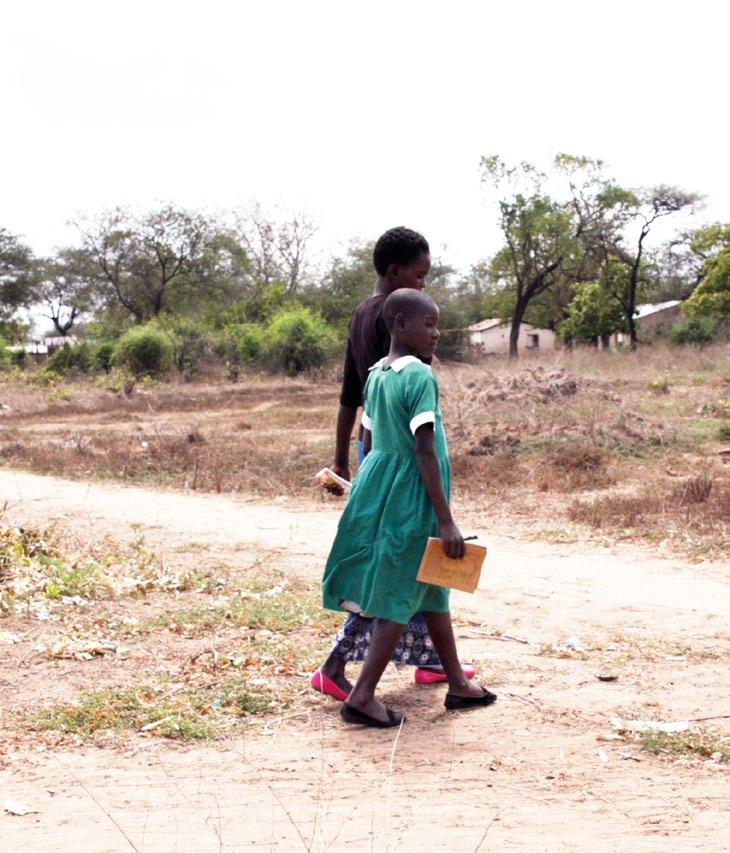
Children’s names have been changed due to the sensitive nature of the content.
CAMFED Association members continue to rise to the challenge of meeting the individual needs of students in their communities by paying forward the support they received. One member, Dorcas Apoore, runs a global basket-weaving collective, ASIGE (Advocacy for Social Inclusion and Girls’ Education). For the last two years, she has doubled her philanthropic contributions, sponsoring 100 women to attend vocational training, 15 to attend higher education, and more than 8,000 to receive menstrual products.
Dorcas says: “I would not be where I am today without the support of CAMFED. That experience instilled in me a strong sense of responsibility to uplift others and help solve the social and economic challenges facing our communities. Supporting others to reach their goals is both a privilege and a duty for me. I do not believe in waiting; If there is an opportunity to help, I do it without delay.”
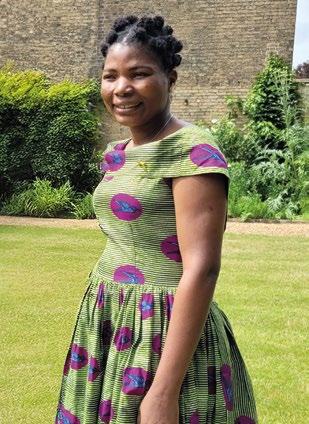
Together we are...
“When you send a girl to school without radically reshaping the support structures around her, you’re just putting a diploma in her hand. If she gets that far. And slotting her right back into a world of poverty and inequality.”
CAMFED CEO Angie Murimirwa - 2023 TED Talk
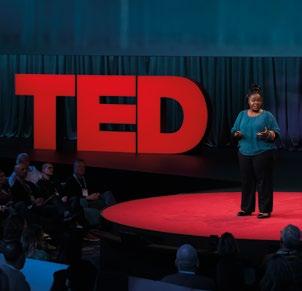
Post-school pathways in an insecure context are usually non-linear.
In Kabwe, Central Province, Zambia, Janet Kaota volunteers her time as a CAMFED Guide to help young women navigate the transition beyond school to work or further education.
“Women are extremely vulnerable to exploitative labor and early marriages at this point in their lives. These are false choices that they make to relieve the financial burden they feel they place on their families,” says Janet.
The pressure is felt as soon as young women complete school. There is commonly a six-month wait to receive exam results, meaning that applications for further education and employment are pushed into the following year.
Even for those with a further qualification, the waiting list for work placement in public-sector positions often runs 3-5 years. For example, in Ghana, work placement for public-sector positions was on hold from 2020 to 2025, and in Zambia more than 70,000 qualified teachers are currently awaiting placement. Opportunities in the private sector also typically have a 3-12 month lead time.
Janet is one of 1,393 young women peer mentors in Zambia (12,319 across CAMFED’s partner countries) who have trained to deliver specialist guidance to girls and young women, in the process bridging their own pathway to independence.
She delivers a 12-month curriculum to school graduates, covering entrepreneurship, leadership, further education opportunities, enterprise support and broader capacities like self esteem and confidence.
She says: “We try by all means to educate young women on what they can do – that they can go on with their life, even though they no longer have the security of school.
“This involves making them realize what their talent is and how to work with others to improve their talent, how to take care of themselves – to avoid something that might bring harm to them.”
21,153 active Learner Guides: young women who have completed school, often with CAMFED’s support, and — through a structured volunteer program — return to their local school to mentor current students. They deliver a life skills program called My Better World that builds critical life-skills.
12,319 active Transition, Business and Agriculture Guides: mirroring the Learner Guide, these programs bring together the expertise of trained, specialist Guides to support young women to transition out of school, and to build sustainable livelihoods post-school.
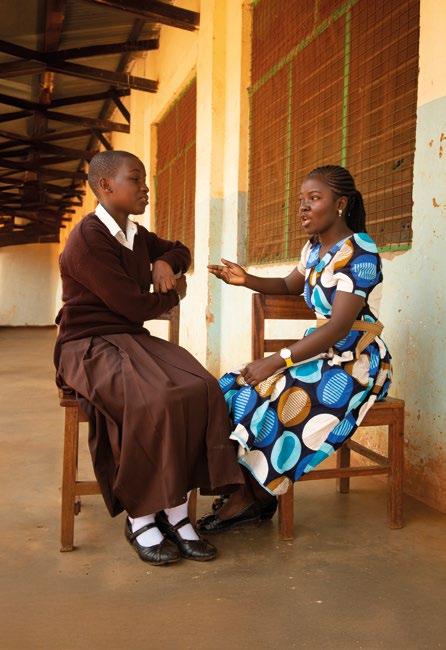
As a CAMFED Guide, Janet can herself access small grants, no-risk loans and a qualification that can support advancement to further education or vocational training.
She says: “Part of the training is building this confidence and self-esteem to say that I am good at something. I never thought that I would be able to stand in front of a group of people. Now I could even be a teacher.”
In Zambia, 78% of young women are pursuing positive pathways within a year of working with mentors like Janet. Across CAMFED’s partner countries to date, 23,998 young women have been supported to take up places in tertiary education, and 124,590 have succeeded in setting up a business.
Helping to unleash the potential of young women like Janet is a core mission for Dutch Foundation Sint Antonius Foundation Projects
Suzanne van der Velden, Foundation Lead, says: “On a recent visit to CAMFED Malawi, we saw how the time after school can be a fragile turning point for young women, with the way forward often rough and not clear. Education lays the essential groundwork, but it is the steady support beyond school that helps build lasting livelihoods for girls. That’s why we teamed up with CAMFED in their effort to provide that crucial support.”
The Ghanaian Government takes a similar view, having this year incorporated CAMFED’s peer-led approach into its National Service Scheme. Graduates from higher education can receive a stipend from the Ghanaian Government in exchange for a year spent serving in rural classrooms to deliver our flagship My Better World curriculum. Already nearly 500 students have participated.
“We are working within systems that already exist, and we are pooling our expertise to make it work smoothly,” says Fairuza Abdul-Rashid Safian, CAMFED Ghana’s Executive Director, who has worked to build and maintain the relationship with the Ghanaian Government over 16 years. “This next step in the journey of government integration is an achievement built on years of work and trust.”
Other government agencies in Ghana, and in other CAMFED partner countries, are engaging in the widespread adoption of our climate-focused and life-skills programs in schools, and the integration of our teacher training into nationwide professional development programs.
Taking the long-view and pivoting to government adoption are only possible with long-term flexible support. CAMFED donor Greater Share operates an innovative financing model that allows for core grants over a ten-year partnership.
Paul Fletcher, Chair, Greater Share, says: “We take a long-term view because meaningful change takes time and stable support is needed for individuals like Janet to reach lasting success and independence.”
“There is no doubt that education of girls is critical but challenges remain for many girls and young women in these communities after they leave school. We are impressed with the way CAMFED programs are designed to enable these girls and young women to build the confidence and get the tools to get a job, start a business or go on to further education while engaging them to work together to help each other and the next generation of girls to break out of exclusion and poverty. We share the conviction that unlocking the potential of girls and young women and developing strong networks that allow young women to ‘pay it forward’ to the next generation has a transformative impact on societies.”
Spokesperson for a private UK-based trust which is approaching its 15th year of partnership with CAMFED.
“I have been very impressed with the way in which CAMFED has direct government involvement. It is great to see that there is support at national levels for such an excellent program supporting women and girls in education in particular.”
Kate Robinson, a UK-based donor who grew up in Zimbabwe in the 1980s.
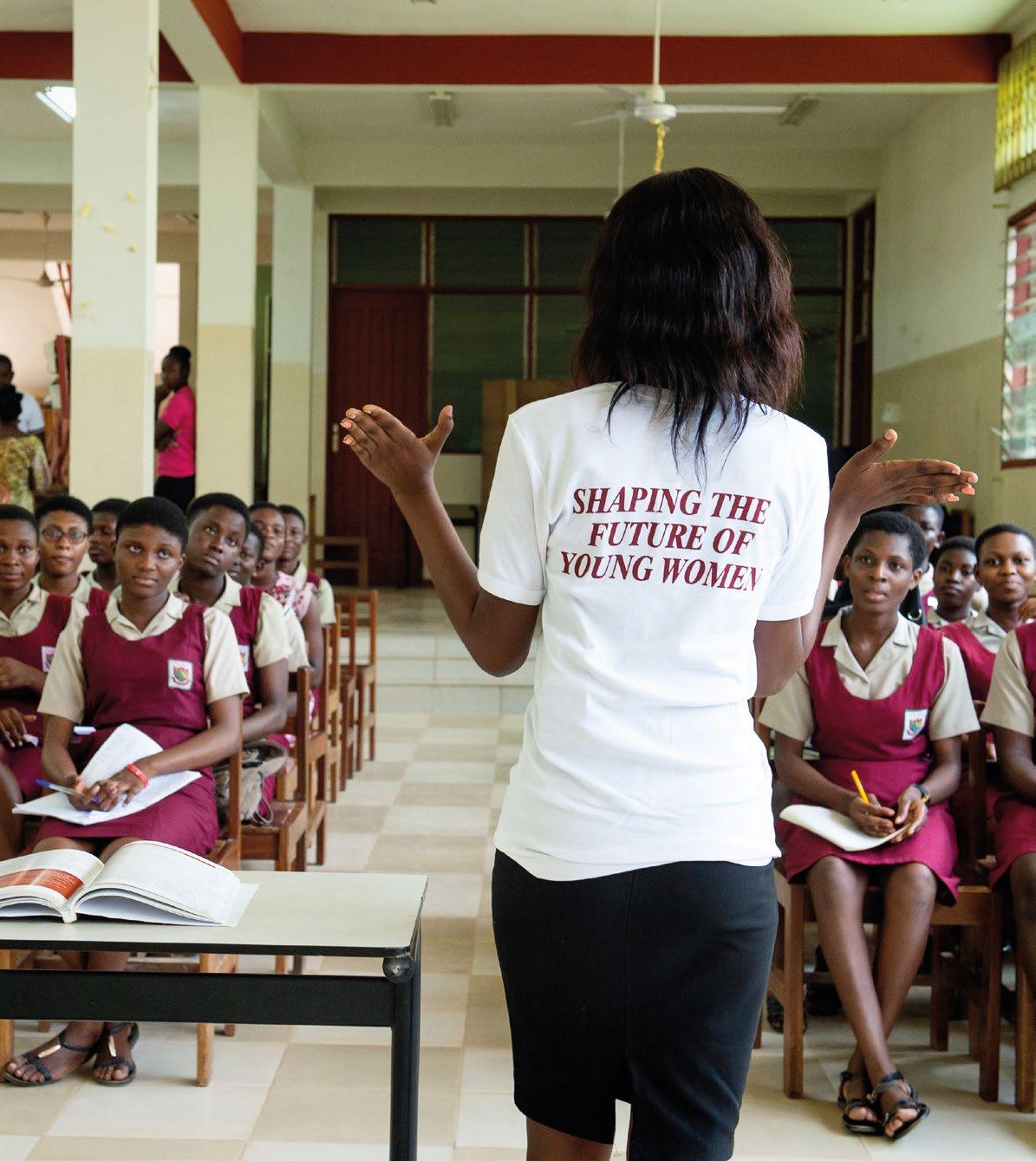
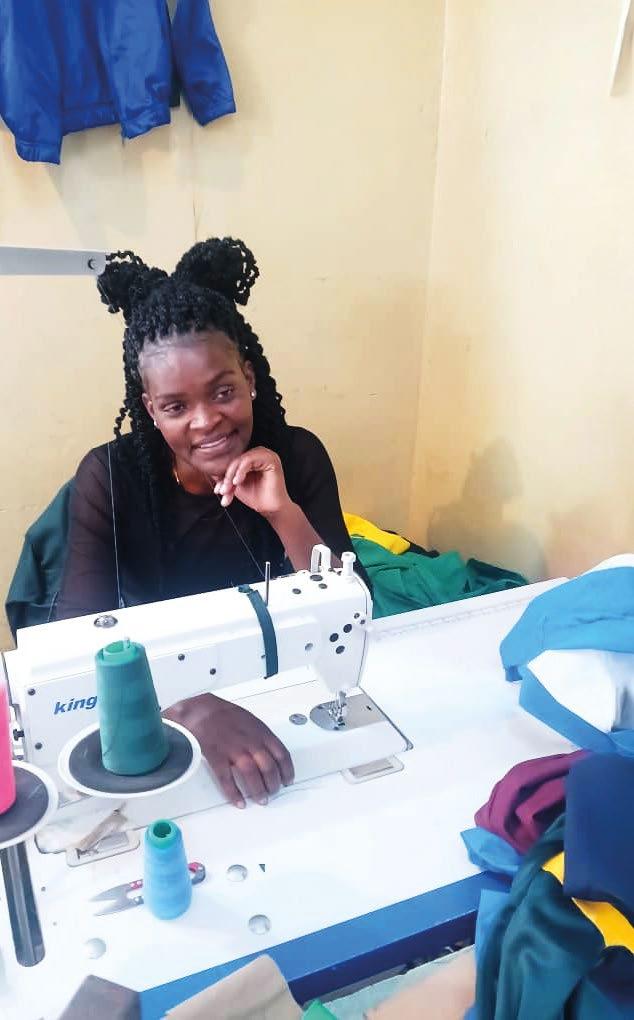
orgoing staple foods for three weeks is a trade-off some rural households have to make in order to purchase a skirt so their
remembers this experience, growing up in Umzingwane
“I joined secondary school seven weeks late because I didn’t have a uniform,” says Siziba. “I saw having a uniform as a luxury, but now I think it’s just because we had no money. I was donated a
“Yes, I was intelligent. I was always the best in the class. But, I had no self-esteem. I couldn’t express myself in front of others because I was either wearing a big skirt sewn with all sorts of different colors, or wearing a blouse that is not
, agrees: “When I was going to school, I had one uniform, which didn’t fit anywhere. It was small, not the right color, and I would spend two days without washing it because
As recipients of CAMFED’s bursary package, Siziba and Hlanjiwe were provided with new
“That’s when I felt like, ‘Yeah, I’m something
A decade later and with continued peer mentorship, the two women –members of the CAMFED Association – have established successful uniform production companies,
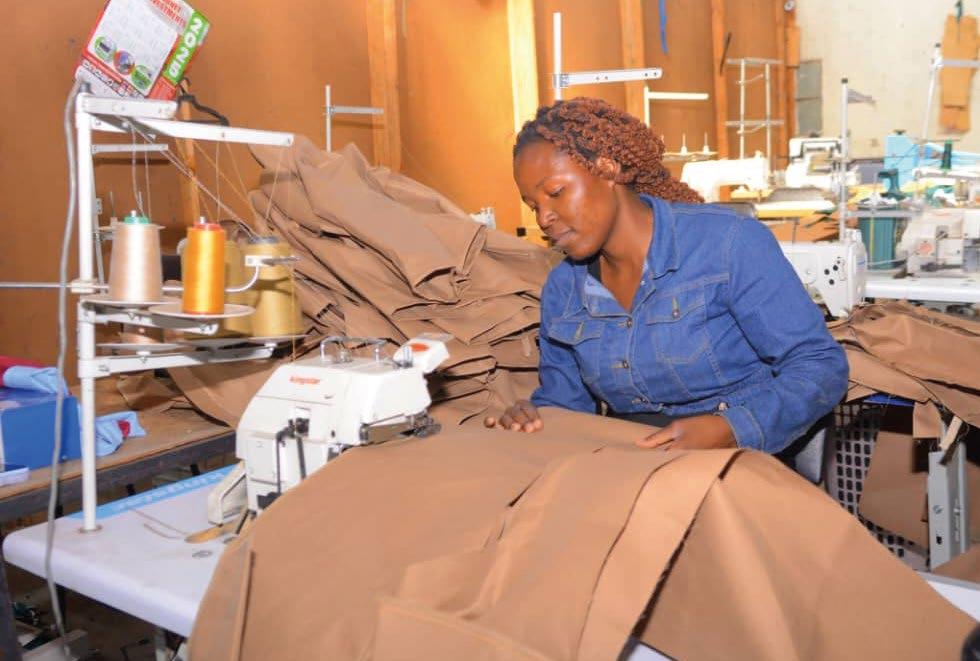
Legend Clothing and Pure Prestige Suppliers. Their ambition is to make affordable uniforms available to other vulnerable girls. In recent years, this has not been easy.
Hlanjiwe says: “The economy of Zimbabwe is not stable. Prices are rising every day, especially on materials and fabrics.”
Siziba adds: “The cost of a skirt is the same as a packet of maize, which can feed a family of five for three weeks. These are the trade-offs that families are making when we talk about school-going costs.”
Over the last five years, prices in Zimbabwe have increased threefold. Fuel over the same period has risen from $1.19/ltr to $1.90, in a context where 49% of the population lives on less than $3 a day.
Approximately 85% of CAMFED’s program funds are spent on purchasing supplies, so managing costs is a high priority. Where possible, we procure from CAMFED Association entrepreneurs because members are committed to affordable, quality production, and to paying forward the opportunity. Siziba and Hlanjiwe received a boost to business when awarded a two-year contract to supply uniforms to 2,688 girls across seven of our partner districts.
They find ways to maintain costs despite unpredictable supply chains – for example, they have kept the cost of a skirt at $16 for the last three years.
“I go to Zambia and South Africa sometimes to get the fabrics that aren’t available in the local markets here,” shares Siziba. This two-day round-trip saves her $200 on fabric.
Hlanjiwe manages costs by importing specialty fabric needed for school blazers and sports garments from South Africa where the prices are lower, and sources the rest locally.
Hlanjiwe and Siziba both also donate uniforms – totaling 378 in the last year. In local currency this is equivalent to $4,000 in donated uniforms, which is enough to purchase a small plot of commercial land, or even build a house.
“When I donate uniforms, I feel honored,” says Hlanjiwe. “I am only a phone call away for the headteachers in my area, who will call me and say ‘There is a learner here who needs a uniform,’ and I can say ‘Bring them to my shop, there will be one for them there.’”
As a result of the entrepreneurial efforts of the CAMFED Association and other cost-saving measures, despite macroeconomic challenges and currency distortion, over the last six years the average cost of a CAMFEDissued bursary has risen less than 50%.
CAMFED’s Director of Risk and Assurance, Sheridan Muruka, says: “Working with remote rural communities poses numerous challenges for costs, quality and quantity. Our procurement process aims to address this by being as local-as-possible and global-where-necessary. Our intention is to keep logistical and associated costs to a minimum, while providing crucial support to local economies thus deepening the impact of CAMFED’s work in these communities.
“We also look for strategic partnerships with key suppliers to enhance economies of scale and opportunity to lock-in prices over longer periods in high-inflation contexts. It is a delicate balance – and something that keeps us busy every day.”
“When
I donate uniforms, I feel honored. I am only a phone call away for the headteachers in my area, who will call me and say: ‘There is a learner here who needs a uniform’ and I can say ‘Bring them to my shop, there will be one for them there.’”

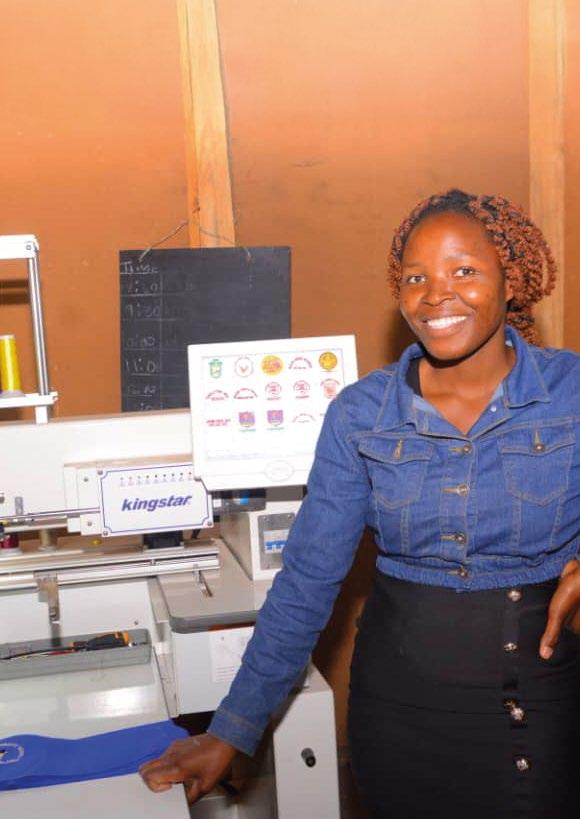
For the first time in 15 years, CAMFED has launched in a new country, Kenya. Here we explore how, with a co-creation approach, we are reaching 2,000 girls within weeks of the official launch.
Kajiado County, with a population of 1.1 million people, is located in southern Kenya. For comparison, Kajiado County has a similar land mass to Rwanda but barely seven percent of the population. The county is home to approximately two thirds of Kenya’s Maasai people, whose main livelihood is livestock rearing.
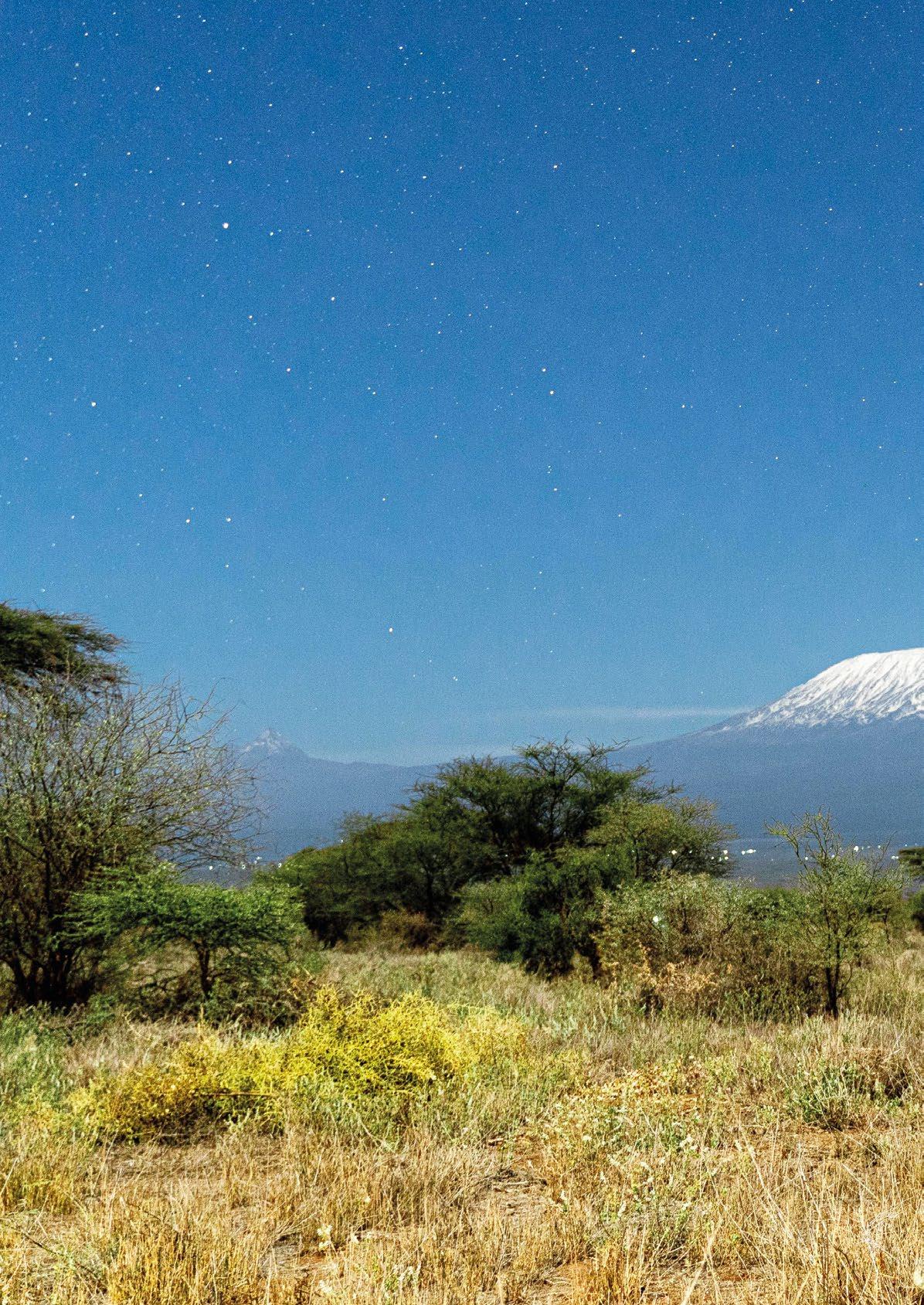
Within 200 kilometers of Nairobi city, Kajiado County is a world apart.
Outside the reach of city services and infrastructure, Kajiado contends with severe economic hardships that have trapped families in a vicious cycle of poverty for generations. Children in pastoral communities walk long distances – often 20km – each day to attend school, and their dependency on livestock causes profound vulnerability during repeated droughts. More than one-in five teenage girls has experienced a pregnancy.
“Kajiado is home to the Maasai people whose traditions have been preserved for generations,” says Fiona Mavhinga, Executive Director of CAMFED Association Development, who grew up in rural Zimbabwe, and has seen expansion into five new countries over her 27 years with CAMFED.
“But despite this rich cultural heritage, the experience of poverty, and deeply-rooted gendered inequalities are carried forward for generations. You’ll see early marriage increase in times of drought, when a family is experiencing distress.“
Since 2022, CAMFED has been working closely with the Kenyan Government to scope out where our partnership could have the greatest impact. Following its commitment to universal basic education and a competency-based curriculum, the Government has identified a role for CAMFED in bringing communities
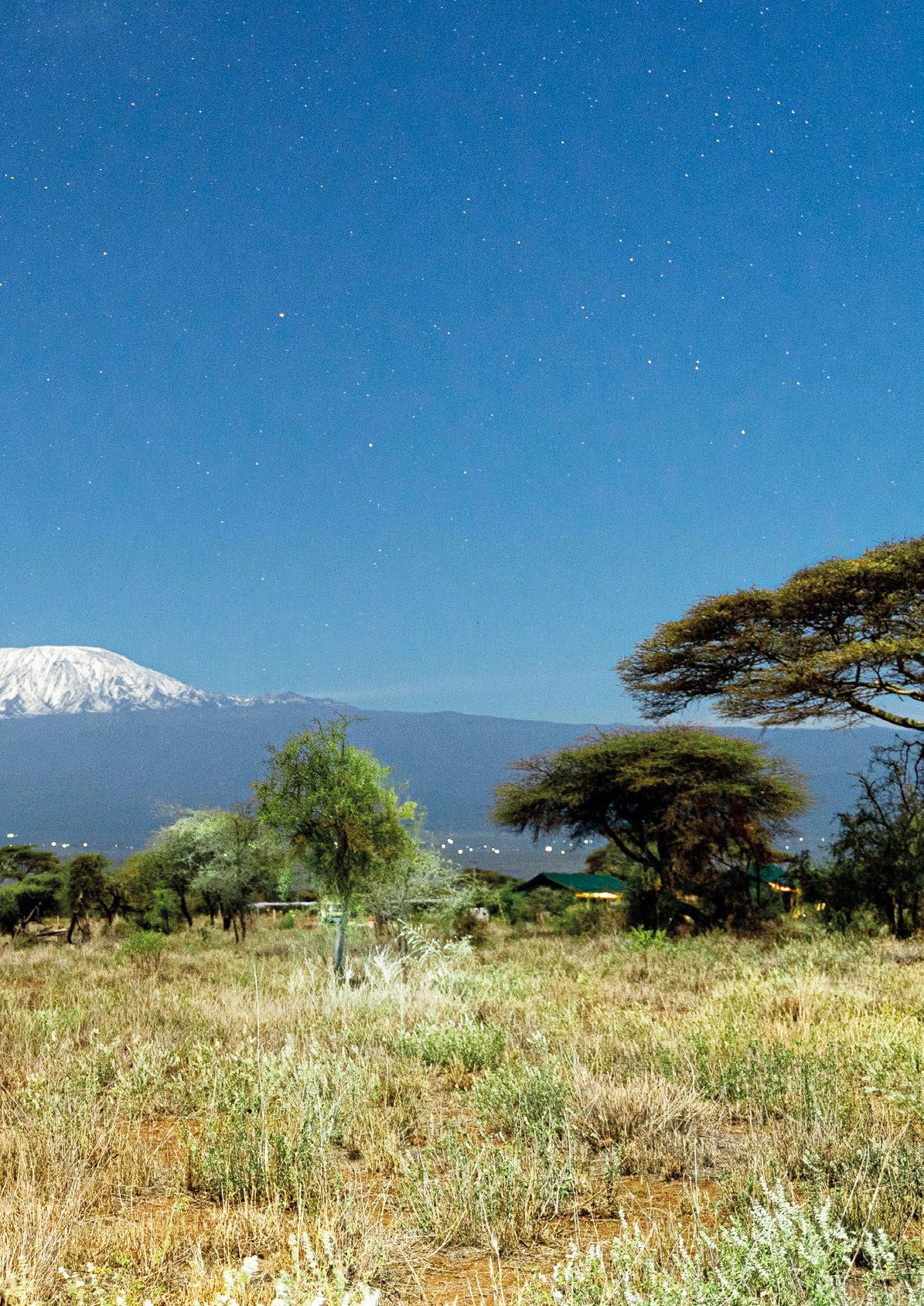
to the decision making table to facilitate the translation of policies into practice. A written agreement allowed CAMFED to start engaging schools in Kajiado in 2023, meaning that at the point of receiving official registration this July, already 2,082 girls had been identified for support across 87 schools.
“We have had meetings with the Government at national level, but also at county and sub-county level,” says Fiona. “We’ve done school visits and met many teachers. We’ve done home visits and community engagement. We’ve met with and listened to parents, traditional leadership, education leadership, children’s development leadership, and social services leadership within Kenya. We listen first; understanding the community’s perspective and priorities, so that together we can create solutions that open doors for girls’ education.”
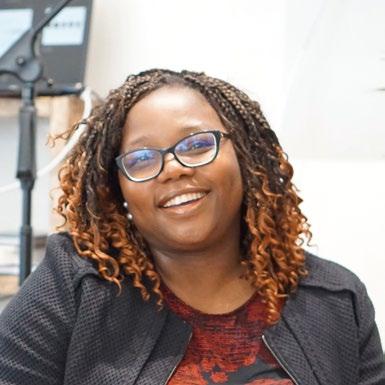
A steering committee in Kajiado brings together relevant departments and government representatives with CAMFED advisors to shape the program. It is chaired by Martin Cheruiyot, the Director of Education for Kajiado County.
“CAMFED is very unusual in its co-creation approach, where we sit and design together,” says Martin. “For example, there has always been a scramble for bursaries at our county offices, which are many kilometers away from the rural villages where students live. Through co-creation of the CAMFED program, we have seen that if you go to the community, to see the schools, you find the children who you would otherwise not reach. Now we release officers for two weeks to be part of the program to identify students or monitor entitlements.”
Martin adds: “The engine is being started with comprehensive support, and it is all about empowering the mind. Communities can relate to why the girl child is important. And now we must be vicious to fight the systems that stagnate communities and strangle the spring of life.”
“Co-creation is a process of hits and misses, but we learn and adapt together.”
Also on the steering committee is Anne Kangethe, County Coordinator Children’s Services, Kajiado County. She helped adapt CAMFED’s selection criteria to respond to the challenges facing marginalized girls in Kajiado County, for example, the long and often unpassable terrain.
“CAMFED went to the neediest of the needy, when no one else might have seen them,” says Anne. “I am looking forward to seeing reductions in child pregnancies and FGM in communities now we are working together.”
She adds: “The seed planted by CAMFED will have a ripple effect. These girls, and their children, will have a better future. In ten years, a mother will be telling her child a beautiful story about CAMFED.”
The steering committee and others engaged in the Kajiado program share a bold ambition to support 60,000 girls across 400+ schools in three counties within five years.
Martin says: “If we unlock Kajiado, I can’t see anywhere we couldn’t help.”
In an era of trust-based giving, one CAMFED donor defines an approach that has even deeper roots – instinctive philanthropy
Lenore England has been an active philanthropist for more than 60 years, the latest in a family whose giving history dates back 120 years.
She says: “I have a deep family history of philanthropy. My great grandmother’s approach in the 1900s has informed each generation since, based on trust, education, and the instinct to walk away from situations which aren’t having an impact.
“It’s all about the connections to and understanding of the work that is happening. It’s very important for me to have a partnership with the organization, and to meet with people directly engaged in and impacted by the work. It is instinctive philanthropy.”
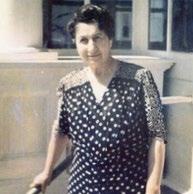
This instinctive approach last year led Lenore to add to her otherwise domestic portfolio with a gift to our global organization. She was inspired by the stories of young women championing girls’ education and leadership. Shifts this year in government aid have only ignited her urgency to act.
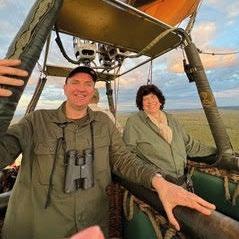
“It’s now more important than ever to continue to give,” she says. “And if we can give more, we’ll certainly do that. But there is also a knowledge that private foundations cannot fill the gap left behind by aid organizations. We’re seeing more discussion now of turning towards grassroots philanthropy to build that capacity and bridge that gap.”
Grassroots philanthropy models like CAMFED’s multiply every donation into greater impact, by enabling young women to establish secure livelihoods after education. On average, each member of the CAMFED Association voluntarily chooses to pay for three more girls to go to school.
Like Lenore, Martha Fanny Gaisie, based in Central Region, Ghana, has a similarly instinctive approach to philanthropy.
Following the birth of her daughter, she feared she had reached the end of her educational path. When she was selected for CAMFED support, she remembers thinking: “I’m going to make it.”
“Think of poverty as a big river, with everything you want on the other side,” says Martha, now 32 and a member of the CAMFED Association.
“When I was young, my future was very blurry. I couldn’t see clearly. The river was big. I couldn’t swim, I couldn’t cross. When I got CAMFED support it was a turning point in my life, it was like finally there was a bridge. As soon as I had it in sight I thought ‘I am going to make it, because there is no way I am leaving anything to chance this time. I am going to do this right.’”
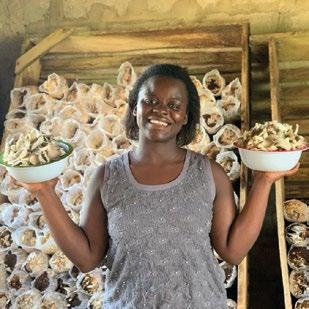
Having a bridge available to her has only made her more determined to multiply that support to others.
Martha explained: “I’ve realized that we have to reinvest the benefits of our education back into our communities. To be the bridge for others to cross behind us, and soon it holds itself up, and becomes selfsustaining. This is the CAMFED model. You support one girl, and she turns around and holds up the bridge for three more to cross as well.
“It is my hope that my family continues to pass on the tradition of giving back, and holding up the bridge for others to pass becomes an intergenerational practice.”
CAMFED has expanded its global community to a new geography this year with registration in Switzerland.
New Chair of the Swiss Board, Zurich-based supporter, Miriam Twaalfhoven, says: “We see a really exciting opportunity in the registration of CAMFED in Switzerland, to bring together existing donors here, and to spread news of the support base to others interested in young women’s education and rights. We are all experiencing so much continual change in the world, but CAMFED has built a solid foundation of impact which matches the strong tradition and culture of philanthropy in Switzerland.
“I believe with these strong roots we can build momentum behind the spirit and altruism of CAMFED’s grassroots activism. Together we can uphold a message that we are one global community defined not by boundaries and distinctions but by common purpose and humanity.”
Together we are...
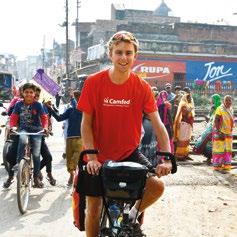
A cyclist has journeyed 12,000-miles across 31 countries as a reminder of the interconnectedness of the world.
Ben Leo Hollis, then 18, left his hometown of Leicester, UK, on a sponsored journey in 2019, and arrived 13 months later in Brisbane, Australia. The funds he dedicated to CAMFED are enough to fund three girls for the entirety of their secondary school education.
“Education is everything, really,” said Ben. “It is one of the world’s most important human rights, and has such a broad impact on the rest of society and local development.
“Living in big cities here in the UK, it’s easy to have an insular view of the world,” says Ben, who has also donated the proceeds from his published exhibition book of the trip, Thirty One Spokes. “I wanted to bring the stories of my trip to others to remind everyone just how interconnected the world is, and how easy it is to throw yourself into a very different environment and build connections between parts of the world.”
Australian potters are doing their part for world peace with the launch of a new exhibition inspired by CAMFED’s CEO.
Peace by Piece will open in November in Sawtell, New South Wales, under the direction of pottery teacher Maryanne Heslop, and 12 female potters aged 69-83.
“The world at the moment is so overwhelming, we just want to contribute to making things better for others in any way we can,” explains Maryanne.
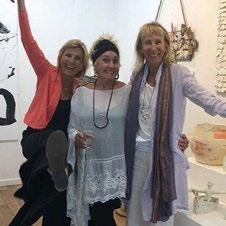
The group was inspired by Angie’s 2023 TED Talk on the role that girls’ education can play in driving a more peaceful world. In it, she says “You’ve all heard the story about girls’ education. It goes like this: To end poverty, educate a girl. To tackle climate change, educate a girl. Girls’ education is the closest thing we have to an actual silver bullet. But only if you do it right.”
“We are all an interconnected sisterhood,” says Maryanne, “and if everybody does a small bit, that’s how change is made.”
These changemakers follow in the footsteps of the 313,000 young women who make up the CAMFED Association, whose members voluntarily donate their own funds to send the next generation of girls to school. In the last year, CAMFED Association members supported 505,193 more girls, 39% more than the year prior.
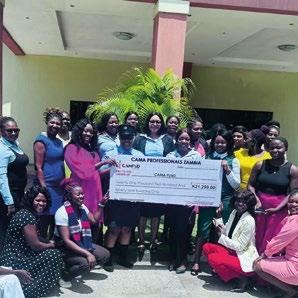
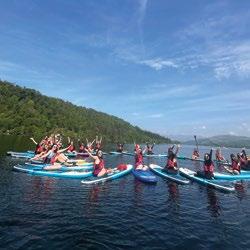
A nationwide community of 100,000 women in the UK shares the same ethos as the CAMFED Association, and now also shares in the impact.
We Got You Boo, a community which fosters connections and friendships for women, has grown from a small online community to a national network for in-person meet-ups – all the while giving a portion of proceeds to CAMFED.
Founder Lydia Leyland explains: “From the very beginning, I knew I wanted We Got You Boo to have a positive impact beyond our own community. We’re all about lifting each other up – and I wanted that ethos to extend to women and girls around the world who may not have the same opportunities we do. When I found CAMFED, it was like, yes — this is it.”
Since becoming a partner of CAMFED last year, We Got You Boo has raised enough money to pay for 13,506 school days, and plans to continue growing its impact.
Lydia says: “We have big plans over the next few years, and continuing to grow our support for CAMFED is a huge part of that vision. Education is life-changing, and the ripple effect it has on communities is huge. From the moment I found CAMFED, I knew instantly that this was a cause our members would be proud to support.”
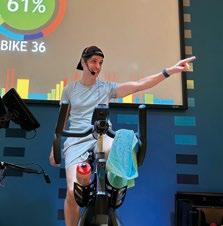
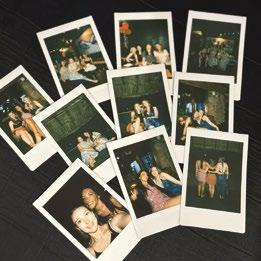
A fitness instructor in Canada who encourages his classes to move the needle as well as their bodies has raised funds for 53 years of schooling in rural Africa.
Emiliano Conde is a full-time entrepreneur and runs fitness classes in his free time. He believes giving back is good for both the body and the soul and sees donating the proceeds of his classes to CAMFED as the best way to do that.
He says: “If we truly seek to reduce suffering, there is no better investment than educating and empowering young girls in the world’s poorest communities. The ripple effect transforms lives, families, and entire nations.
“I’m grateful that CAMFED gives me the opportunity to be part of this powerful change so easily.”
Together we are...
This year, CAMFED’s CEO Angie Murimirwa was named among other global leaders and celebrities on the TIME100 list of the world’s most influential people. As one of the first girls to receive CAMFED support, Angie’s selection is about her individual journey, and is also recognition of the global movement growing behind girls’ education.
We spoke to Cate Matthews, Executive Editorial Director of TIME100, to understand why Angie’s inclusion was important this year.
How did you identify Angie as one of the most influential people in the world?
To arrive at our list of the world’s most influential people, we pool ideas from everywhere under the sun and winnow down from a world of 8 billion.
We’re looking for the most extraordinary scientists, the most extraordinary leaders in culture and the arts, in politics and of course in education. We have bureaus all across the world and expert contacts who reach out to tell us about the folks that they’re seeing create change and come up with innovative solutions. Every year about a thousand names get written down. When we came across Angie’s story, we just knew that we had to include her and recognize her this year.
Are you looking at personal qualities or the organization, or both?
We look at a number of things – among them is scale. So of course CAMFED has helped millions of girls over the course of its history. But it’s not enough for the organization to be extraordinary – the voice at the head of it needs to be extraordinary as well. Real change has to be informed by lived experience. That ground-up expertise and insight is integral to an organization. And of course, Angie, having herself benefited from CAMFED, and then continuing to pay that forward is just a very powerful story. The idea that when you educate a girl you educate a community is made real in the fact that CAMFED alumnae go on to support future girls.
Whenever we recognize a person, what we’re doing is recognizing an idea and the momentum that led them to that place. It is about finding a voice that can represent a larger movement and effort.
It isn’t a common occurrence for grassroots leaders to rub shoulders with Hollywood celebrities and Heads of State. What’s the vision behind bringing these leaders together at the TIME 100 gala?
There’s a unique power in putting grassroots leaders alongside cultural forces and recognizing them as equal contributors to our collective future. It is true of both, that the stories we tell help us understand what’s possible. In Angie’s case, investing in the education of young people across the world creates entirely new possibilities. A lot of people argue that to change the world, the first thing you need to do is educate a girl. And she’s the living proof.
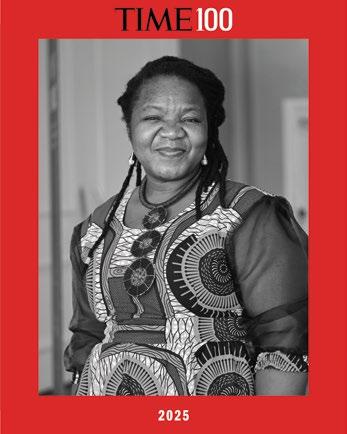
CAMFED was named as a beneficiary of the The New York Times Communities Fund, in its second year: the only international organization among the year’s chosen nonprofits. This selection was as a result of the award-winning, grassroots-led model supporting girls to go to school, succeed and become leaders in their communities. On September 19, CAMFED attended the Fund launch event at the The New York Times’ offices.
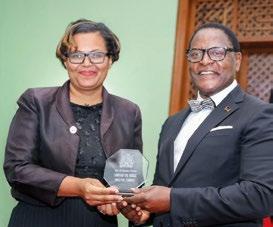
The President of Malawi awarded CAMFED Best Promoter of Girls’ Education at a gala dinner at Sanjika Palace in Blantyre in October.
The award, presented by Lazarus Chakwera, President of the Republic of Malawi, is given to highlight the leadership of a Non Governmental Organization driving sustainable development. It was received by Executive Director of CAMFED Malawi, Susan Silika
CAMFED’s CEO, Angie Murimirwa, was named the winner of the prestigious Africa Education Medal 2024. The medal is given to an outstanding individual who has demonstrated impact, leadership, and advocacy in the field of education. It recognizes the tireless work of leaders transforming education across the continent – celebrating those who have lit the spark of change so others will be inspired to take up the torch.
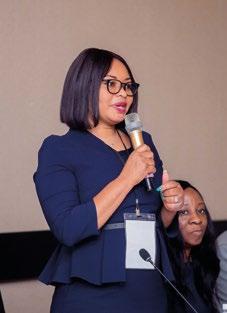
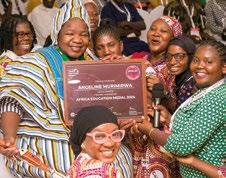
CAMFED Zambia was named one of UNESCO’s prize laureates for Girls’ and Women’s Education in honor of its “outstanding and innovative projects.”
Receiving the Prize, Namenda Malupande, Executive Director of CAMFED Zambia, said: “Winning this Prize means so much to our entire CAMFED community – to the girls we serve, the young women leaders they become, and every parent, teacher, traditional leader and local official who is playing their part. It recognizes – on the global stage – a model that places girls’ rights, hopes and aspirations at the heart of everything we do. And it recognizes the role of partnerships - including with education Ministries – because it takes all of us to transform the structures that hold girls back.”
Zambia-based champion Naomi Chanda has been listed among the BBC’s 100 most inspiring women.
Naomi was honored for her work as a farmer and trainer growing resilience to climate shocks and tackling food insecurity. Once supported through school by CAMFED in rural Zambia, Naomi shares her expertise in sustainable farming and innovative techniques with smallholder farmers and other young women in CAMFED’s leadership network. To date, she has supported at least 150 young women with farming techniques that adapt for changing weather patterns.
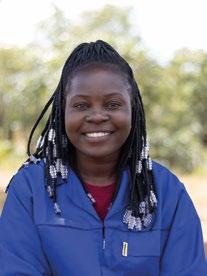
Your philanthropy is the ignition switch in a chain reaction that enables educated young women to give back to their communities. Together with them, we thank you for all the opportunities your donations open up. As one way of saying thank you, we invite you to join the CAMFED Circle, which is designed to connect you with the impact your giving has in effecting transformative change in rural communities.
Members of the Circle can expect to receive:
Quarterly updates on the impact of your philanthropy in the communities we serve
Virtual events with CAMFED Association members at the forefront of our work
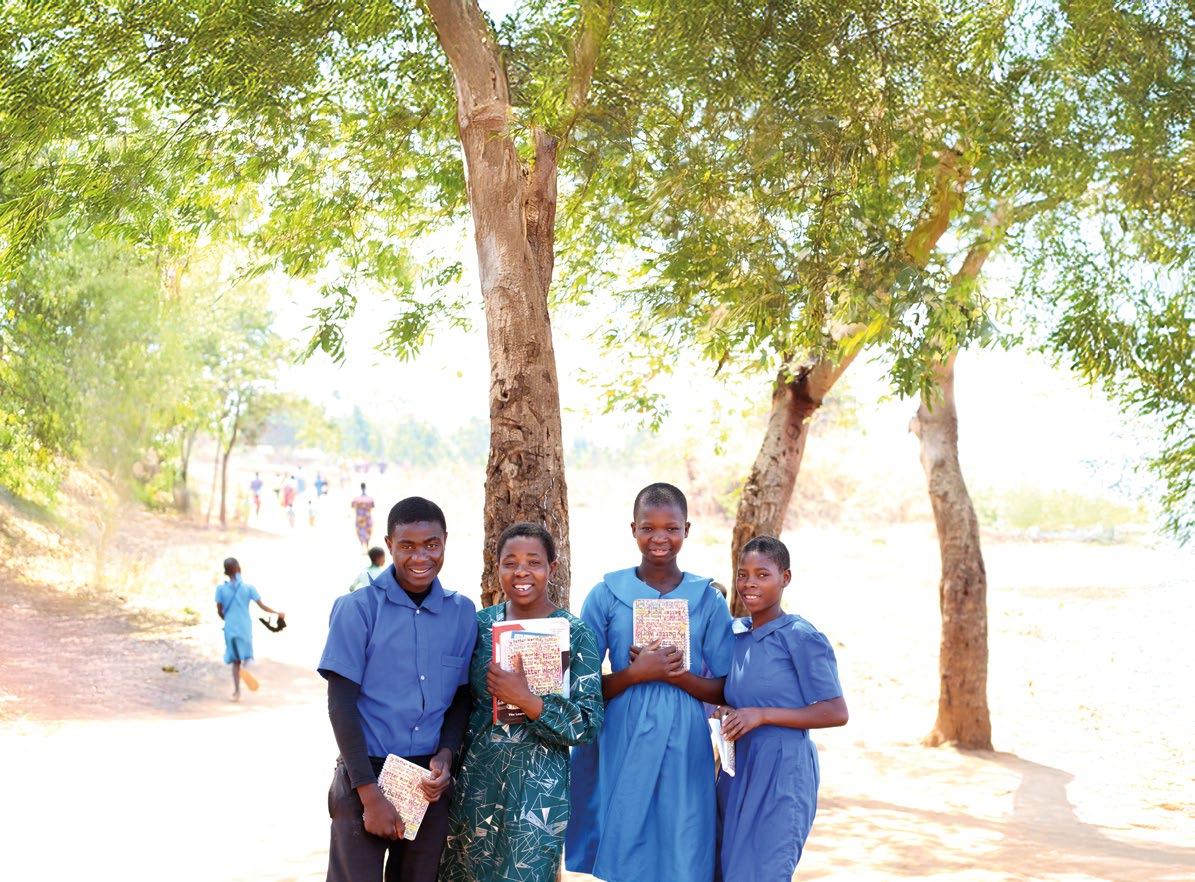
Dedicated point of contact with a member of CAMFED staff
Annual report on your gift
Priority invitation to an exclusive event with CAMFED Association members and leadership
Invitation to a program visit (as available)
If you would like to learn how you can join the Circle, please visit camfed.org/circle or contact us at philanthropy@camfed.org.
CAMFED International
Emily Zemke Chief Development Officer ezemke@camfed.org
Katie Maude-Barker Associate Director km-barker@camfed.org
Becs Brocken Head of Corporate Relations bbrocken@camfed.org
Karen Jones Manager, Philanthropic Partnerships kjones@camfed.org
Bethany Lee Corporate Partnerships & Fundraising Officer blee@camfed.org
General inquiries philanthropy@camfed.org switzerland@camfed.org
+44(0)1223 362 648 (UK)
+1 415 963 4489 (USA)
+1 416 861-0755 (Canada)
CAMFED USA
Brooke Hutchinson Executive Director bhutchinson@camfed.org
Ann Marie Almeida Director of Development aalmeida@camfed.org
Adrienne Dishman Manager, Institutional Partnerships adishman@camfed.org
Kaitlyn Neel Manager, Major Gifts kneel@camfed.org
CAMFED Canada
Heather Bunting Senior Manager, Donor Engagement hbunting@camfed.org
